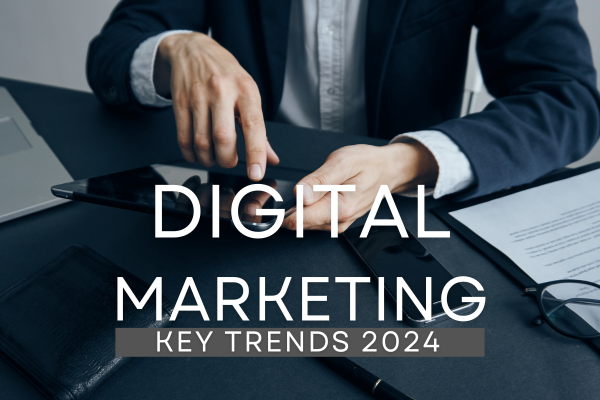-
Future Students
-
Admissions
Programs
Programs for Domestic Students
Courses
-
-
Current Students
-
Part Time
Student Logins
Student Logins
-
-
International Students
-
About Pace
-
About Pace
-
The Future of Digital Marketing in 2024: Key Trends Shaping the Industry

The digital marketing industry is evolving at an unprecedented pace, and at the heart of this evolution lies artificial intelligence (AI). Businesses are going to behold an era that was never imagined. In the race to provide innovative and creative products and services to customers, businesses are welcoming contemporary trends and modern technologies.
By harnessing the power of artificial intelligence, businesses can revolutionize their marketing strategies, enabling them to reach the right audience at the right time with personalized, engaging content. In this blog post, we will explore what the future of digital marketing will look like and what is going to be on trend in the year 2024.
In a recent study that the Boston Consulting Group conducted with Harvard, it was found that ChatGPT, in its current form, already improves the right-brain performance of marketers by 40 percent. This figure is expected to rise exponentially in the coming couple of years. This will let the marketers invest their extra time in generating more content and more ideas. Moreover, this excess of updated content will be personalized instead of generalized, meaning more customized emails from your favorite brands showing images of your age and gender and casing the product relevant to you. And customers embark on a human-like experience powered by a bot that assures a productive outcome.
The advent of generative AI in marketing signifies a monumental shift in how businesses approach their advertising and engagement strategies, offering a realm of possibilities previously unimagined. At its core, AI marketing transcends the traditional boundaries of data analysis. and customer insight, allowing companies to delve deeper into the intricacies of consumer behavior and preferences with unparalleled precision. This sophisticated approach empowers marketers to craft strategies that are not only data-driven but are also highly responsive to the ever-evolving marketplace. Utilizing generative AI to enhance sales strategies. Generative AI is frequently employed in sales campaigns.
Here are some key use cases:
- Content Creation for Sales Materials: By producing specialized content at scale, generative AI can help content marketing initiatives. This includes cases, whitepapers, posts on blogs geared for engines of search, social networking revisions, sales scripts, leaflets, and sales strategies.
- CRM System Integration: CRM systems contain a wealth of unstructured data from customer interactions, support tickets, social media comments, and email communications. By using generative AI for analyzing this data, organizations may better satisfy their customers by anticipating issues related to trends, sentiment, and customer needs.
- Customer Segmentation: By processing vast volumes of information about customers, artificial intelligence (AI) that generates has the capacity to spot trends and divide consumers into several groups according to their needs, preferences, and behavior. This enables sales personnel to develop offers, communications, and approaches that are unique to each section and connect with individuals.
Predictive analytics: this stands as a cornerstone of AI marketing, will be trending in 2024, offering businesses a window into the future desires and behaviors of their customers. By employing sophisticated AI algorithms to sift through and analyze extensive datasets, organizations gain the ability to spot emerging patterns and preferences that elude the human eye. This foresight enables companies to not only react to current market trends but also anticipate them, crafting marketing strategies that address consumer needs before they fully materialize. This forward-looking approach allows for the delivery of highly targeted messages and offerings, seamlessly aligning with the evolving expectations of consumers. Imagine being able to adjust your marketing efforts based on predictive insights that indicate a shift in consumer behavior or preferences, ensuring that your brand remains relevant and engaging. The power of predictive analytics lies in its ability to empower businesses to act pre-emptively, offering solutions and experiences that consumers themselves might not yet realize they desire. The magic of this AI-driven tool in its capacity to transform vast, incomprehensible data sets into actionable insights, thereby enabling brands to forge a path that feels intuitively aligned with consumer journeys. By leveraging predictive analytics, marketers can enhance the precision of their campaigns, ensuring that every marketing dollar is spent reaching the individuals most likely to engage, convert, and remain loyal to the brand. This strategic foresight not only elevates the effectiveness of marketing efforts but also enriches the consumer experience, paving the way for a future where businesses and customers are more closely connected.
AI in content generation: This tool is content generation and crafting compelling narratives. Employing AI in content generation is not just about keeping pace with the digital marketing landscape. It helps marketers generate blog posts, social media posts, appealing headings, and content for website creation. AI not only helps in writing the content, but it can also be changed into voice content. You may think that chatbots are a thing of the future. But OpenAI announced Sora, a text-to-video model that can create realistic-looking moving images. There is no doubt that the content world is evolving at a much faster pace with the advent of AI. This innovative application of an AI marketing tool has unlocked the potential for creating content that not only resonates deeply with the consumer but does so with efficiency and scale previously deemed unattainable. By leveraging the power of AI, marketers are afforded the luxury of crafting tailored messages and stories, each fine-tuned to meet the unique preferences and interests of their target audience.
Personalization of marketing campaigns: This is going to be the heart of modern marketing. The next development in the trend can be seen in Through the meticulous analysis of vast amounts of customer data in real time, AI-powered algorithms are now capable of curating content and making recommendations uniquely tailored to everyone’s preferences and behaviors. This elevated level of personalization enables businesses to not only meet but exceed customer expectations, creating highly customized experiences that resonate on a personal level. The transformative power of AI in personalization is a game-changer for businesses seeking to deepen customer relationships and enhance loyalty. By delivering content that is meticulously aligned with individual customer preferences, brands can engage with their audience in a more meaningful and impactful way.
Chatbots and Virtual Assistants: The integration of AI-powered chatbots and virtual assistants into customer service strategies marks a significant leap forward in the realm of digital engagement. These innovative tools are at the forefront of transforming interactions, offering instant, around the-clock support tailored to each customer's unique needs and inquiries. The beauty of such technology lies in its ability to provide swift, personalized assistance, thereby elevating the customer experience to new heights of satisfaction and efficiency. For instance, many big players like McDonalds, Sobeys, etc. have adopted this even for the recruitment process, where an AI-generated personal assistant is asking and directing you to the relevant links to apply for an open position.
Regardless of language or cultural background, picture yourself having casual, human-like discussions with your audience. This is the power of voice search technology-driven conversational marketing. Marketers are adopting conversational marketing to break down linguistic boundaries and esta blish deeper connections with a variety of consumers by utilizing my multilingual communicat ion abilities.
Maximizing the Impact of Ad Campaign Optimization: Algorithms based on machine learning are employed by AI-powered advertising structures like Google Ads and Facebook Ads to improve targeting of ads, bids, and placement in real-time.
Influencer Marketing: Micro-influencers are gaining center stage in influencer marketing, which is moving in the direction of authenticity and relatability. Why? Because they possess what brands truly require: a sincere relationship with their followers. While the number of followers these influencers have may not be in the millions, those who do are active and rely on their advice. They are therefore extremely beneficial to marketers seeking a reputable means of reaching a wider audience. The emphasis these days is on developing long-lasting relationships that accurately represent the brand's values, rather than just one-time promotions. Thus, if you're considering launching an influencer campaign, think about collaborating with micro-influencers who share the same values as your company. These days, congruence and genuineness are everything.
In conclusion, where we can see numerous benefits of AI in marketing, one should be wondering about what can go wrong and if this is a threat to those who belong to this industry. As it has been observed, AI is not just a tool; it's a strategic imperative for digital marketers looking to thrive in today's competitive landscape. There will be a distinction made between those who employ AI and those who do not. You'll have trouble if you don't employ AI because most roles require some sort of AI to function. As Karim Lakhani, a Harvard Business School professor, stated, “AI is not going to replace humans, but humans with AI are going to replace humans without AI.






